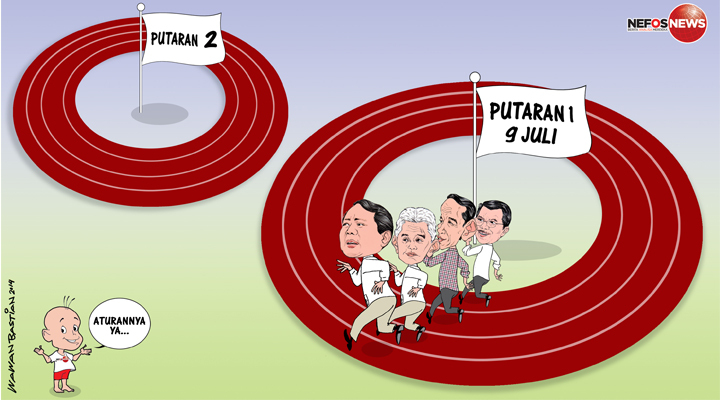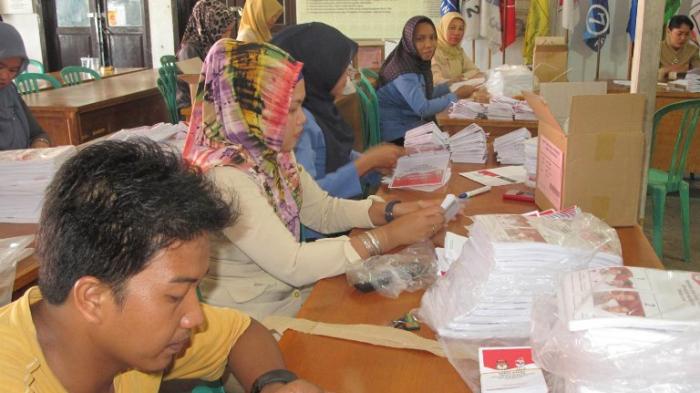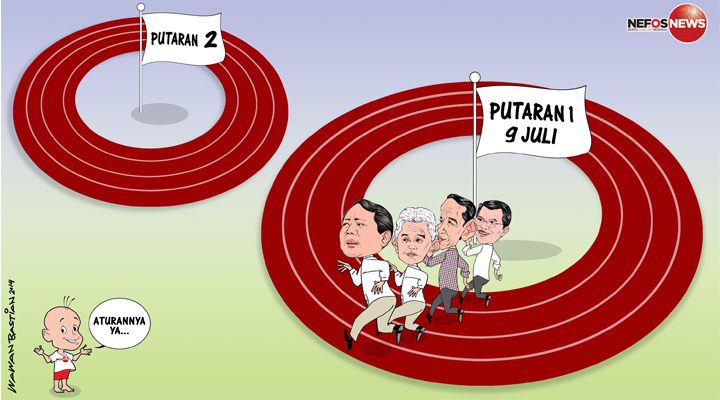
Will either candidate get the votes needed to cross the threshold outlined by the 2008 Presidential Election Law? Photo credit: nefonews.com
Indonesia’s General Electoral Commission (KPU) has recently announced that it is anticipating the possibility of two rounds of presidential elections.
This is because the 2008 Presidential Election Law stipulates that candidate pairs can be installed after a presidential election only if they receive 50% of votes across all of Indonesia, with at least 20% of the vote across more than half of Indonesia’s provinces (Article 159(1)). If one pair does not achieve this, the Law requires a second-round run-off election between the top two candidates (Article 159(2)).
The Presidential Election Law was clearly drafted on the presumption that more than two pairs of presidential candidates would compete in any given presidential election. Indeed, the Presidential Election Law seems concerned to keep the number of presidential candidates down, including by imposing by requiring presidential pairs to be supported parties or coalitions with 20% of seats in the DPR or 25% of votes in the election.
Of course, the 2014 presidential election is being contested by only two pairs: Prabowo-Rajasa and Jokowi-Kalla.
One question that has arisen is whether, if on 9 July, Pair A gets more than 50% of the vote across Indonesia, but not 20% in more than half of Indonesia’s provinces, holding a second round will be necessary.
This is because Pair A would have won a second round election by obtaining more than 50% of the vote. Worse, what if a second round is held and Pair A get more than 50% in the first round election, but Pair B get more than 50% in a second round? Pair B would win the election, but its legitimacy would become questionable given that it had lost in the first round.

In Jambi, election commission delegates found numerous damaged ballots for the upcoming presidential elections. Photo credit: jambi.tribunnews.com
Fortunately, on current polling, these are unlikely scenarios in a two horse race: both pairs can expect to obtain more than 20% of the vote from less than half of Indonesia’s provinces. This means that the pair obtaining more than 50% in the first round will almost certainly be declared the winner.
However, late last week, Perludem lodged a challenge against the need for a second round with the Constitutional Court. While the KPU itself had considered seeking clarification from the Constitutional Court, it decided not to, in light of Perludem’s application.
It is always foolish to attempt to predict judicial decisions, especially in Indonesia, where decision-making can be particularly unpredictable. In my view, however, it seems very unlikely that the Constitutional Court will require that there be two rounds of a two-pair election, unless by some bizarre circumstance, both pairs obtain the same number of votes in the first round.
The Court’s main function in these types of cases is to make sure that Indonesia’s national parliament does not breach or contradict the Constitution in the legislation it enacts.
What does the Constitution say about presidential elections? Article 6A(3) is essentially the same as Article 159(1) of the Presidential Election Law. It states: ‘The presidential and vice presidential candidate pair that obtains more than 50% of the votes in the general election with at least 20% of votes in every province across more than half of Indonesia’s provinces’ is declared the winner.
Article 6A(4) of the Constitution says: ‘If there is no candidate pair elected, the two candidate pairs obtaining the first and second most votes in the election are chosen by the people directly and the pair obtaining the most votes is inaugurated…’.
On my reading, this is somewhat ambiguous. It certainly could be interpreted to require a second round run-off election. However, it could also simply mean that if one party does not meet the threshold in Article 6A(3), the total number of votes of the top two parties are compared and the one with the most wins. It is also possible that Article 6A(4) is not intended to apply to two-pair presidential elections.
Indonesian lawmakers have chosen the run-off election interpretation. Article 159(2) of the General Election Law is slightly different to Article 6A(4). It says that ‘If there is no candidate pair elected…the two candidate pairs obtaining the first and second most votes in the election are chosen again (dipilih kembali) by the people directly…’ [my emphasis].
It is quite likely that the court will simply decide that because the Constitution does not use the word ‘again’ in Article 6A(4), it should therefore be removed from Article 159(1). The Court might then choose another interpretation of Article 6A(4) – probably in order to reach the conclusion that only a single round is required for elections contested by two candidates – and require that Article 159(2) be interpreted in that way.
The Court might also exhibit concern about the inefficiencies and costs of holding a second-round election that serves no purpose. These were amongst the reasons given by the Court for deciding, in a case heard earlier this year, that general and presidential elections must be held together from 2019.
Let’s hope that common sense prevails here and that Indonesians are not forced to vote twice for precisely the same candidates. Any other result would be absurd and would be unlikely to achieve anything, except further undermining the credibility of Indonesia’s electoral systems.
………….
Simon Butt is an ARC Australian Postdoctoral Research Fellow and Associate Director of the Centre for Asian and Pacific Law at the University of Sydney.
 Facebook
Facebook  Twitter
Twitter  Soundcloud
Soundcloud  Youtube
Youtube  Rss
Rss 